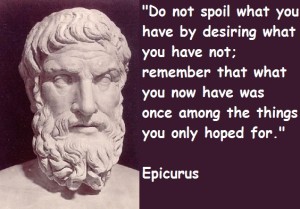 Because of the close connection of pleasure with desire-satisfaction, Epicurus devotes a considerable part of his ethics to analysing different kinds of desires. If pleasure results from getting what you want (desire-satisfaction) and pain from not getting what you want (desire-frustration), then there are two strategies you can pursue with respect to any given desire: you can either strive to fulfill the desire, or you can try to eliminate the desire.For the most part Epicurus advocates the second strategy, that of paring your desires down to a minimum core, which are then easily satisfied.
Because of the close connection of pleasure with desire-satisfaction, Epicurus devotes a considerable part of his ethics to analysing different kinds of desires. If pleasure results from getting what you want (desire-satisfaction) and pain from not getting what you want (desire-frustration), then there are two strategies you can pursue with respect to any given desire: you can either strive to fulfill the desire, or you can try to eliminate the desire.For the most part Epicurus advocates the second strategy, that of paring your desires down to a minimum core, which are then easily satisfied.
Epicurus distinguishes between three types of desires: natural and necessary desires, natural but non-necessary desires, and “vain and empty” desires. Examples of natural and necessary desires include the desires for food, shelter, and the like. Epicurus thinks that these desires are easy to satisfy, difficult to eliminate (they are ‘hard-wired’ into human beings naturally), and bring great pleasure when satisfied. Furthermore, they are necessary for life, and they are naturally limited: that is, if one is hungry, it only takes a limited amount of food to fill the stomach, after which the desire is satisfied. Epicurus says that one should try to fulfil these desires.
Vain desires include desires for power, wealth, fame, and the like. They are difficult to satisfy, in part because they have no natural limit. If one desires wealth or power, no matter how much one gets, it is always possible to get more, and the more one gets, the more one wants. These desires are not natural to human beings, but inculcated by society and by false beliefs about what we need; e.g., believing that having power will bring us security from others. Epicurus thinks that these desires should be eliminated.
An example of a natural but non-necessary desire is the desire for luxury food. Although food is needed for survival, one does not need a particular type of food to survive. Thus, despite his hedonism, Epicurus advocates a surprisingly ascetic way of life. Although one shouldn’t spurn extravagant foods if they happen to be available, becoming dependent on such goods ultimately leads to unhappiness. As Epicurus puts it, “If you wish to make somebody wealthy, don’t give him more money; rather, reduce his desires.” By eliminating the pain caused by unfulfilled desires, and the anxiety that occurs because of the fear that one’s desires will not be fulfilled in the future, the wise Epicurean attains tranquility, and thus happiness.